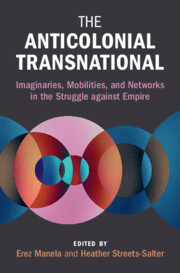Book contents
- The Anticolonial Transnational
- Global and International History
- The Anticolonial Transnational
- Copyright page
- Contents
- Figures
- Contributors
- Acknowledgments
- 1 Introduction
- Part I The Many Anticolonial Transnationals
- Part II Solidarities and Their Discontents
- Part III Anticolonialism in a Postcolonial Age
- 10 The Unexpected Anticolonialist: Winifred Armstrong, American Empire, and African Decolonization
- 11 Beyond the NIEO: Self-Reliance as an Alternative Vision of Postcolonial Development
- 12 Guam’s Quest for Indigenous Chamorro Self-Determination in the Age of Pacific Anticolonialism
- 13 Reggae, Sound Systems, and Arrested Decolonization in Bermuda
- 14 Epilogue: The National and the Colonial in the Anticolonial Transnational
- Index
12 - Guam’s Quest for Indigenous Chamorro Self-Determination in the Age of Pacific Anticolonialism
from Part III - Anticolonialism in a Postcolonial Age
Published online by Cambridge University Press: 10 August 2023
- The Anticolonial Transnational
- Global and International History
- The Anticolonial Transnational
- Copyright page
- Contents
- Figures
- Contributors
- Acknowledgments
- 1 Introduction
- Part I The Many Anticolonial Transnationals
- Part II Solidarities and Their Discontents
- Part III Anticolonialism in a Postcolonial Age
- 10 The Unexpected Anticolonialist: Winifred Armstrong, American Empire, and African Decolonization
- 11 Beyond the NIEO: Self-Reliance as an Alternative Vision of Postcolonial Development
- 12 Guam’s Quest for Indigenous Chamorro Self-Determination in the Age of Pacific Anticolonialism
- 13 Reggae, Sound Systems, and Arrested Decolonization in Bermuda
- 14 Epilogue: The National and the Colonial in the Anticolonial Transnational
- Index
Summary
During the 1980s and 1990s, Indigenous Chamorro political leaders and activists challenged United States imperialism on Guam, particularly the issues of heavy militarization and increased immigrant and settler presence. Influenced by Indigenous decolonization movements throughout the Pacific, Chamorros engaged in the political process of self-determination as stipulated by Chapter XI of the United Nations Charter. Through the Guam Commonwealth Movement, they chose to articulate their right to self-determination as an Indigenous people, emphasizing Indigenous political rights and culture within an island whose population was increasingly multicultural. Although the movement was ultimately stalled by the US Congress due to its perceived unconstitutionality, the quest for Chamorro self-determination reveals the limitations of the UN saltwater thesis for colonized Indigenous peoples living within settler colonial islands, demonstrates how articulations of self-determination become inextricable from Indigenous rights, and illustrates how US imperialism in the Pacific persists well into the twenty-first century.
Keywords
- Type
- Chapter
- Information
- The Anticolonial TransnationalImaginaries, Mobilities, and Networks in the Struggle against Empire, pp. 241 - 264Publisher: Cambridge University PressPrint publication year: 2023

